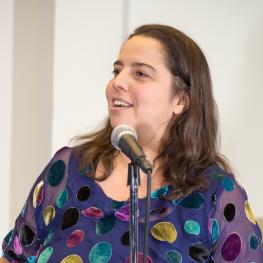The Music of Resilience: Songs of Jewish Survival East and West
Thirtieth Anniversary Concert
American Philosophical Society
Benjamin Franklin Hall
427 Chestnut Street, Philadelphia
To mark its thirtieth birthday, the Katz Center presents a concert exploring Jewish musical culture from different parts of the world, East and West. This sonic tribute to Jewish survival and cultural vitality features songs nearly lost to memory but now brought to life by extraordinary musical scholars.
Act I: Yiddish Glory
Lost and Found Songs of Soviet Jews during World War II
Featuring Anna Shternshis and Psoy Korolenko
Grammy-nominated singer-songwriter Psoy Korolenko (Dartmouth College) and historian Anna Shternshis (University of Toronto) bring to life long lost Yiddish songs of World War II in this all-new concert and lecture program. Collected by Moisei Beregovsky and other scientists of the Kiev Cabinet for Jewish Culture, these Yiddish songs were confiscated and hidden by the Soviet government in 1949, and have only recently come to light. They tell stories of how Soviet Jews lived and died under the German occupation, used music to document Nazi atrocities, fought in the Red Army, worked on the home front, and made sense of it all through Yiddish music. None of these songs were known until they were accidentally discovered in the basement of the Ukrainian National Library in the 1990s. The performance of these materials gives voice to Soviet Jewish women, children, and men who never got to tell their stories but left us their incredible songs.
Act II: Monajat
An Intergenerational Remix of Persian Jewish Songs
Featuring Galeet Dardashti with Shanir Blumenkranz, Philip Mayer, Zafer Tawil, and Max ZT; video art by Dmitry Kemell
Galeet Dardashti’s multi-sensory project and album, Monajat, is inspired by old and haunting recordings of Jewish prayers chanted by her late grandfather, Younes Dardashti, a famous master singer of Persian classical music in 1950s/60s Iran. Galeet reinvents the ancient ritual of Selihot by singing with remixed samples of her grandfather’s legacy recordings. Riffing on these old tapes, Galeet composes a soundscape of original music performed by an ensemble of acclaimed Middle Eastern and jazz musicians. Dynamic video art created by artist/designer Dmitry Kemell envelopes the audience, bringing listeners into the ritual. This powerful project is both deeply Jewish and deeply Persian at a time of tremendous antisemitism and Islamophobia.
Featuring
Anna Shternshis
University of Toronto
Anna Shternshis is the Al and Malka Green Professor in Yiddish Studies and director of the Anne Tanenbaum Centre for Jewish Studies at the University of Toronto. She is the author of Soviet and Kosher: Jewish Popular Culture in the Soviet Union, 1923–1939 (Indiana UP, 2006) and When Sonia Met Boris: An Oral History of Jewish Life under Stalin (Oxford UP, 2017), and most recently co-author (together with Oleg Budnitsky, David Engel, and Gennady Estraikh) of Jews in the Soviet Union: A History: War, Conquest, and Catastrophe, 1939–1945 (New York UP, 2022). Together with artist Psoy Korolenko, Shternshis created and directed the Grammy-nominated Yiddish Glory project, an initiative that brought back to life forgotten Yiddish music written during the Holocaust in the Soviet Union. A recipient of a 2020 Guggenheim Fellowship, she is currently working on a book about Yiddish music created in Nazi-occupied Ukraine tentatively titled Last Yiddish Heroes: A Lost and Found Archive of the Holocaust in the Soviet Union.
Galeet Dardashti
New York University
Galeet Dardashti is a performer, anthropologist, and advocate of Middle Eastern and North African Jewish culture. She founded the all-woman Middle Eastern Jewish ensemble, Divahn, and received a Six Points Fellowship to pursue her multidisciplinary project and nationally acclaimed solo release, The Naming, which interprets some of the compelling women of the Bible. In her upcoming commissioned release, Monajat, Dardashti reinvents the reflective musical ritual of penitential prayers (seliḥot) using digital technology to sing with recordings of her famed Iranian grandfather. As a scholar, Dardashti’s work examines Mizrahi cultural politics/music, and Israeli media. Her current book project explores the Mizrahi piyyut (sacred poetry/song) phenomenon in contemporary Israel. Dardashti has also begun research on progressive, millenial Sephardi/Mizrahi North American Jews. She has been a postdoctoral fellow at NYU and Rutgers and assistant professor/musician in residence at JTS. She is currently a visiting professor at NYU.
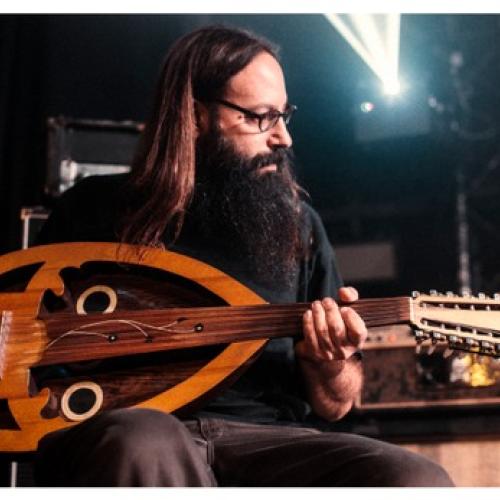
Shanir Blumenkranz
Born in 1975 to Egyptian/Polish parents in Brooklyn, Shanir was given his first instruments (pots and pans from the kitchen and a 3-string guitar) at the age of 2. He has been active in the New York avant-garde music scene since 1997 and is a featured artist on over 150 albums as a composer, arranger, producer, and performer—including over 50 releases on John Zorn’s Tzadik record label.
Performing in concert halls and festival stages all over the world, Shanir has toured and recorded with Yo-Yo Ma, John Zorn, Cyro Baptista, Trey Spruance (Secret Chiefs 3, Mr. Bungle), Wu Fei (with Symphony Orchestra), The Fugu Plan (Yuka Yamamoto), Marc Ribot, Anthony Braxton, Galeet Dardashti, and Yemen Blues—as well as leading his own ensemble Abraxas (Tzadik).
Shanir’s exploration into the experimental, combined with the ritual/spiritual/tribal/trance musics of the world, led him to co-found Chant Records in 2017, and Chant has released over 85 albums worldwide to date.
Recently, Shanir co-composed the critically acclaimed work by Yemen Blues called “Shabazi” (with Ravid Kahalani), as well as a new project of traditional Yemenite music called “Voices of Yemen” in partnership with the Association for Yemenite Society, Culture, Research, and Documentation.
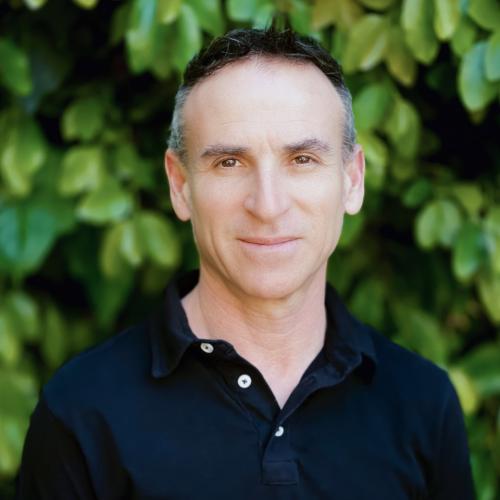
Dmitry Kemell
Dmitry Kemell is an interdisciplinary multimedia artist and a professor at Loyola Marymount University’s Department of Art and Art History. He is also the founding director of Lustre, an art studio that develops work for the gallery, the screen, the stage and the city.
His artistic practice explores the fusion of myth, memory, culture, and transcendent states through creative media transformation of surface, form and space. His creative repertoire spans video art installations and environmental projections, concert visuals, 3D graphic art, music videos and animated digital films. In addition to his visual production, he is also a composer and music producer with credits on diverse video, animation, and multimedia projects.
Dmitry Kemell's creative work has been featured in numerous publications and art reviews as well as in Los Angeles Times, LA Weekly and CNN, and has been exhibited widely at venues such as: Art Platform, Art Basel, Glow-Santa Monica, Boston Jewish Music Festival, Autumn Lights, Athens Video Art Festival, ISEA, FILE, 404 Festival of Art and Technology, Optronica, Digital Graffiti, Festival Miden, Nanjing Institute of Visual Arts Museum, Archaeological Museum of Messenia, The Fowler Museum at UCLA, Bell-Roberts Contemporary Art Gallery, OCCCA, e4c media gallery, Gallery 825, The Standard Hotel, Highways Performance Space, Ford Theatre, Kennedy Center for the Performing Arts, Grand Performances, Los Angeles Theater Center.
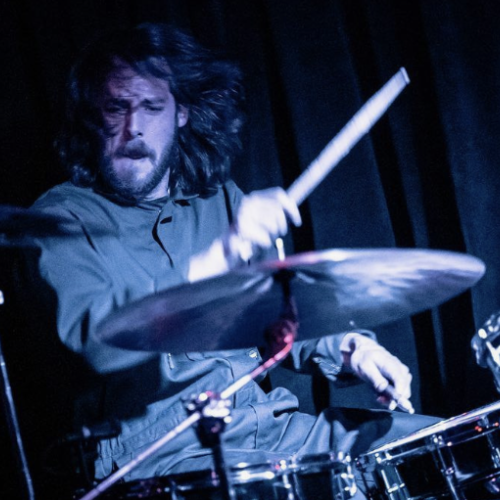
Philip Mayer
Philip Mayer is a New York City–based percussionist and drummer. With a background in jazz and American popular music, Philip's interest in music traditions from around the world led him to travel and study extensively in India, Israel, Turkey, Spain and Italy.
On the drum set, Philip tours regularly with multiplatinum-selling artist Natalie Merchant and he originated the drum book for the hit Broadway musical “The Band’s Visit,” which won 10 Tony Awards and a Grammy. As a specialist in Arabic and Turkish music, Philip has toured all over the Middle East performing at venues such as the Presidential Palace in Abu Dhabi and the Al Bustan Palace in Oman.
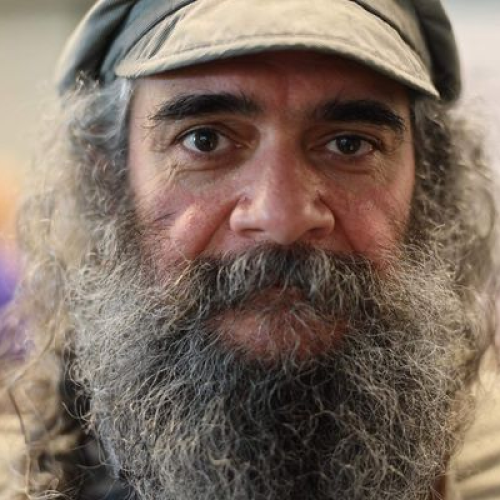
Pavel Lion
Pavel Lion, better known by his art name Psoy Korolenko, is a singer-songwriter, translator, scholar, and journalist, often referred to as a “wandering scholar” and an “avant-bard.”
His multilingual one-person cabaret balances various genres and traditions, among which East European music, Klezmer, and Yiddish play a significant role. On stage since 2000, he has released several books of essays, poetry, and song lyrics, and more than 20 CDs, solo or in collaboration with active Jewish and Klezmer musicians, including “Opa!” (Daniel Kahn, Igor Krutogolov) and “Oy Division” (Michael Alpert, Bob Cohen, Jake Shulmann-Ment), and has appeared in movies such as “Soul Exodus” (Hungary), “The Wandering Muse” (Canada). He has participated in various international music projects, such as “Brothers Nazaroff” and “Defesa.” Psoy’s 2020 “Psoetry” is a bilingual selection of his original songs and songs by other artists, including Bob Dylan, Tom Waits, and Daniel Kahn, that Psoy translated into Russian.
Co-creator of Yiddish Glory, Psoy is a voting member of the American Recording Academy, one of the organizers or the Russian American open-air music festival JetLAG, and a participant in multiple klezmer music festivals. He has a PhD in philology and has been artist/scholar-in-residence at Trinity College, University of Michigan, and Dickinson College, and he is currently a lecturer at Dartmouth College.
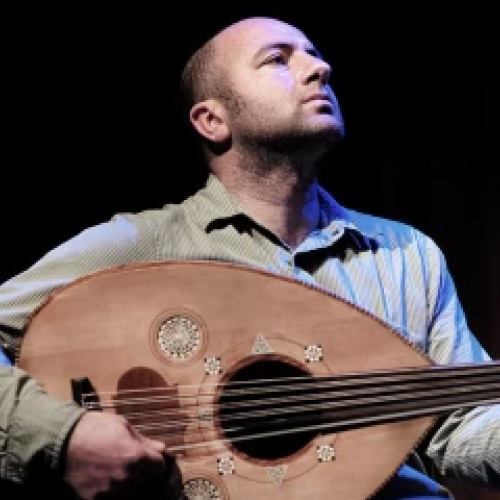
Zafer Tawil
An accomplished Palestinian musician based in New York City, Zafer Tawil is a virtuoso on oud, violin, and qanoun, and is a master of Arabic percussion. He has performed with numerous musicians, ranging from the pop star Sting to avant-garde composer/performer Elliot Sharpe to masters of Arabic music such as Simon Shaheen, Chab Mami, Bassam Saba, and George Ziadeh, among many others. Zafer has composed music for a number of film soundtracks, most recently Jonathan Demme’s My Favorite American (not yet released), Rachel Getting Married, and the documentary Until When. Albums include “Mumtastic,” by Shusmo; Gaida Hinawi’s debut CD, “Levantine Indulgence,” and two CDs by Amir AlSaffar’s Two Rivers: “Two Rivers Musicians” and the yet-to-be-released “Enaana.” Shanir has held workshops on Arabic music at numerous universities throughout the United States.
Max ZT
A Chicago native who now calls Brooklyn home, Max ZT developed his unique sound through decades of study as far afield as Senegal, where he studied with the famed Cissoko Griot family, and India, where he received the prestigious AIIS fellowship to study with the legendary Pandit Shivkumar Sharma, the pioneer of the santoor. With his band House of Waters, he’s scored an Emmy-winning documentary for ESPN and released seven critically acclaimed albums on Snarky Puppy’s GroundUP Music label.
Most recently, his album “On Becoming” was nominated for Best Contemporary Instrumental Album at the 2024 Grammy Awards. A trio pioneer of the instrument, Max ZT builds his own instruments, and in 2005, won the National Hammered Dulcimer Championship.
